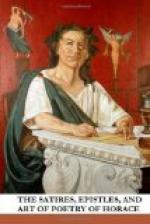No hand can match Fundanius at a piece
Where slave and mistress clip an old man’s fleece:
Pollio in buskins chants the deeds of kings:
Varius outsoars us all on Homer’s wings:
The Muse that loves the woodland and the farm
To Virgil lends her gayest, tenderest charm.
For me, this walk of satire, vainly tried
By Atacinus and some few beside,
Best suits my gait: yet readily I yield
To him who first set footstep on that field,
Nor meanly seek to rob him of the bay
That shows so comely on his locks of grey.
Well, but I called him muddy, said you’d find
More sand than gold in what he leaves behind.
And you, sir Critic, does your finer sense
In Homer mark no matter for offence?
Or e’en Lucilius, our good-natured friend,
Sees he in Accius nought he fain would mend?
Does he not laugh at Ennius’ halting verse,
Yet own himself no better, if not worse?
And what should hinder me, as I peruse
Lucilius’ works, from asking, if I choose,
If fate or chance forbade him to attain
A smoother measure, a more finished strain,
Than he (you’ll let me fancy such a man)
Who, anxious only to make sense and scan,
Pours forth two hundred verses ere he sups,
Two hundred more, on rising from his cups?
Like to Etruscan Cassius’ stream of song,
Which flowed, men say, so copious and so strong
That, when he died, his kinsfolk simply laid
His works in order, and his pyre was made.
No; grant Lucilius arch, engaging, gay;
Grant him the smoothest writer of his day;
Lay stress upon the fact that he’d to seek
In his own mind what others find in Greek;
Grant all you please, in turn you must allow,
Had fate postponed his life from then to now,
He’d prune redundancies, apply the file
To each excrescence that deforms his style,
Oft in the pangs of labour scratch his head,
And bite his nails, and bite them, till they bled.
Oh yes! believe me, you must draw your pen
Not once nor twice but o’er and o’er again
Through what you’ve written, if you would entice
The man that reads you once to read you twice,
Not making popular applause your cue,
But looking to fit audience, although few.
Say, would you rather have the things you scrawl
Doled out by pedants for their boys to drawl?
Not I: like hissed Arbuscula, I slight
Your hooting mobs, if I can please a knight.
Shall bug Pantilius vex me? shall I choke
Because Demetrius needs must have his joke
Behind my back, and Fannius, when he dines
With dear Tigellius, vilifies my lines?
Maecenas, Virgil, Varius, if I please
In my poor writings these and such as these,
If Plotius, Valgius, Fuscus will commend,
And good Octavius, I’ve achieved my end.
You, noble Pollio (let your friend disclaim
All thought of flattery when he names your name),
Messala and his brother, Servius too,
And Bibulus, and Furnius kind and true,
With others whom, despite their sense and wit
And friendly hearts, I purposely omit;
Such I would have my critics; men to gain
Whose smiles were pleasure, to forego them pain,
Demetrius and Tigellius, off! go pule
To the bare benches of your ladies’ school!




